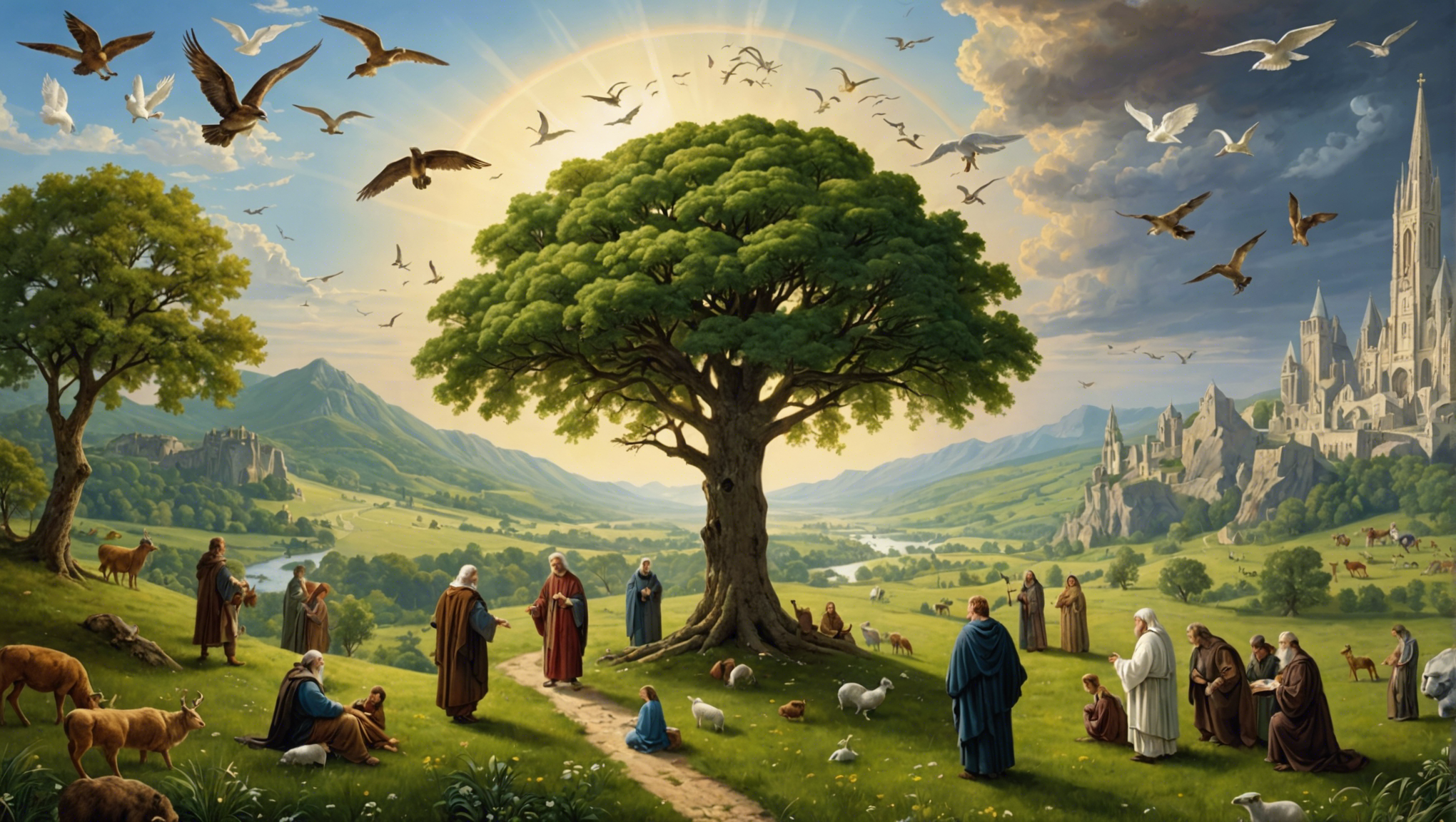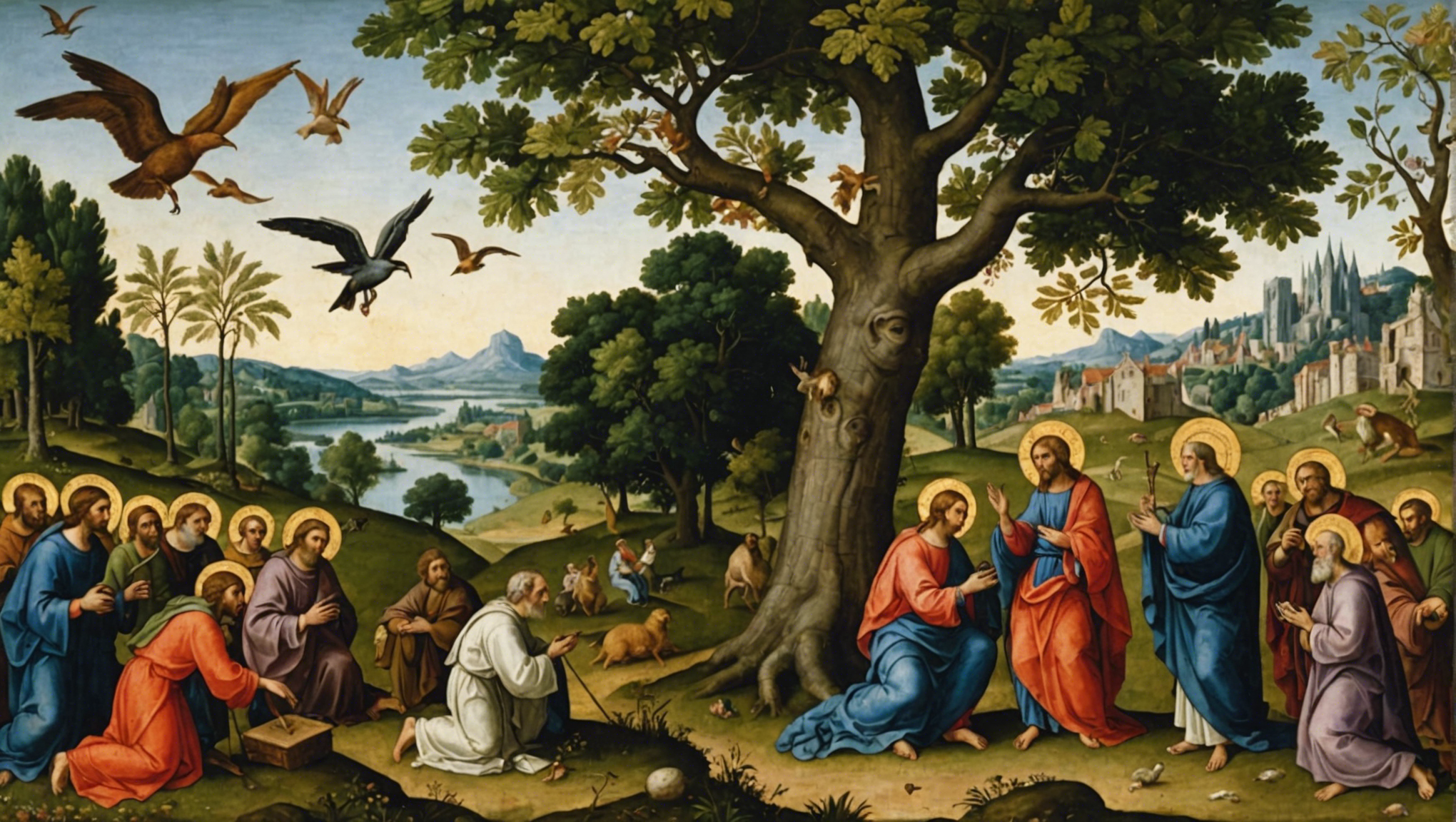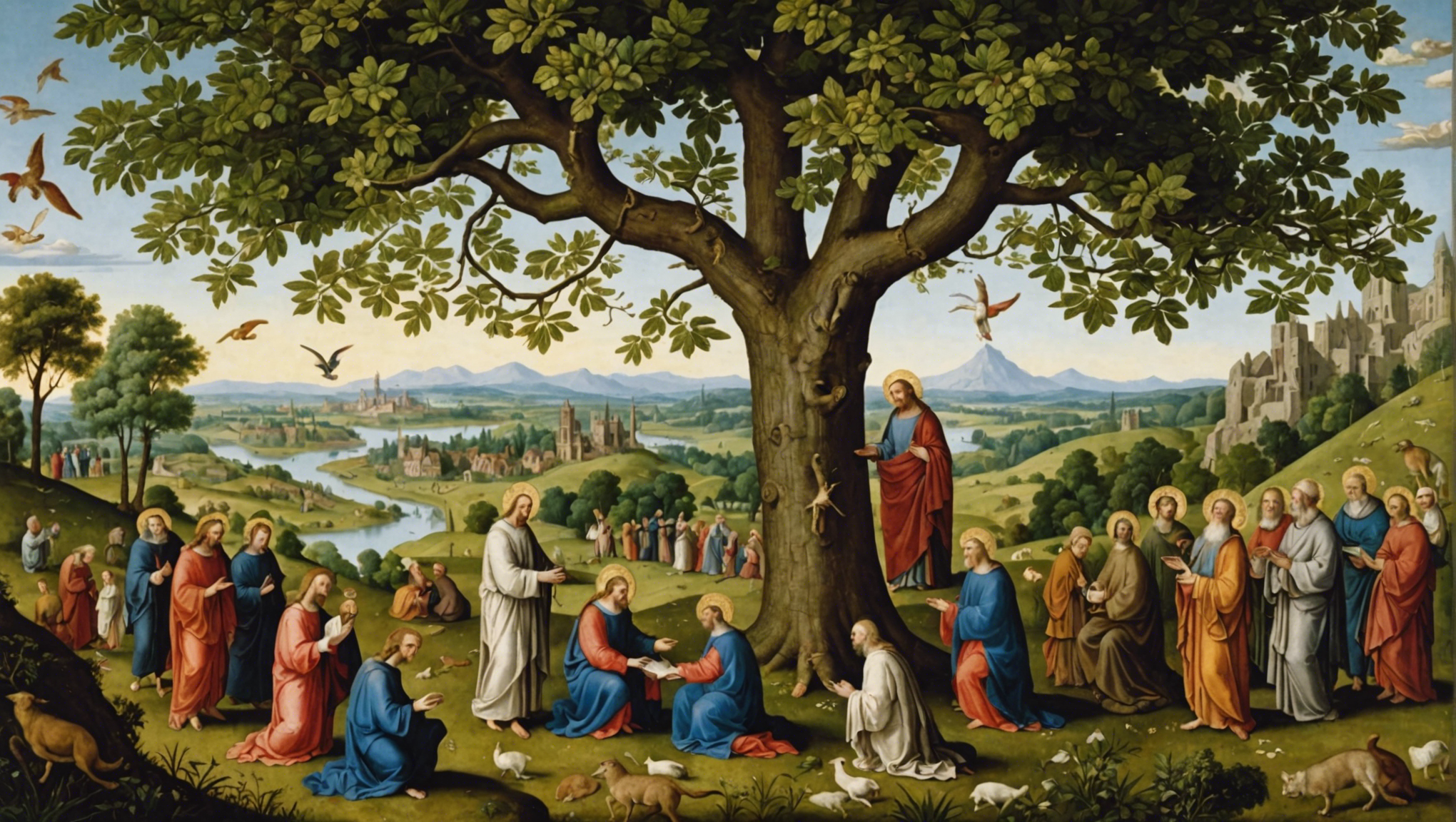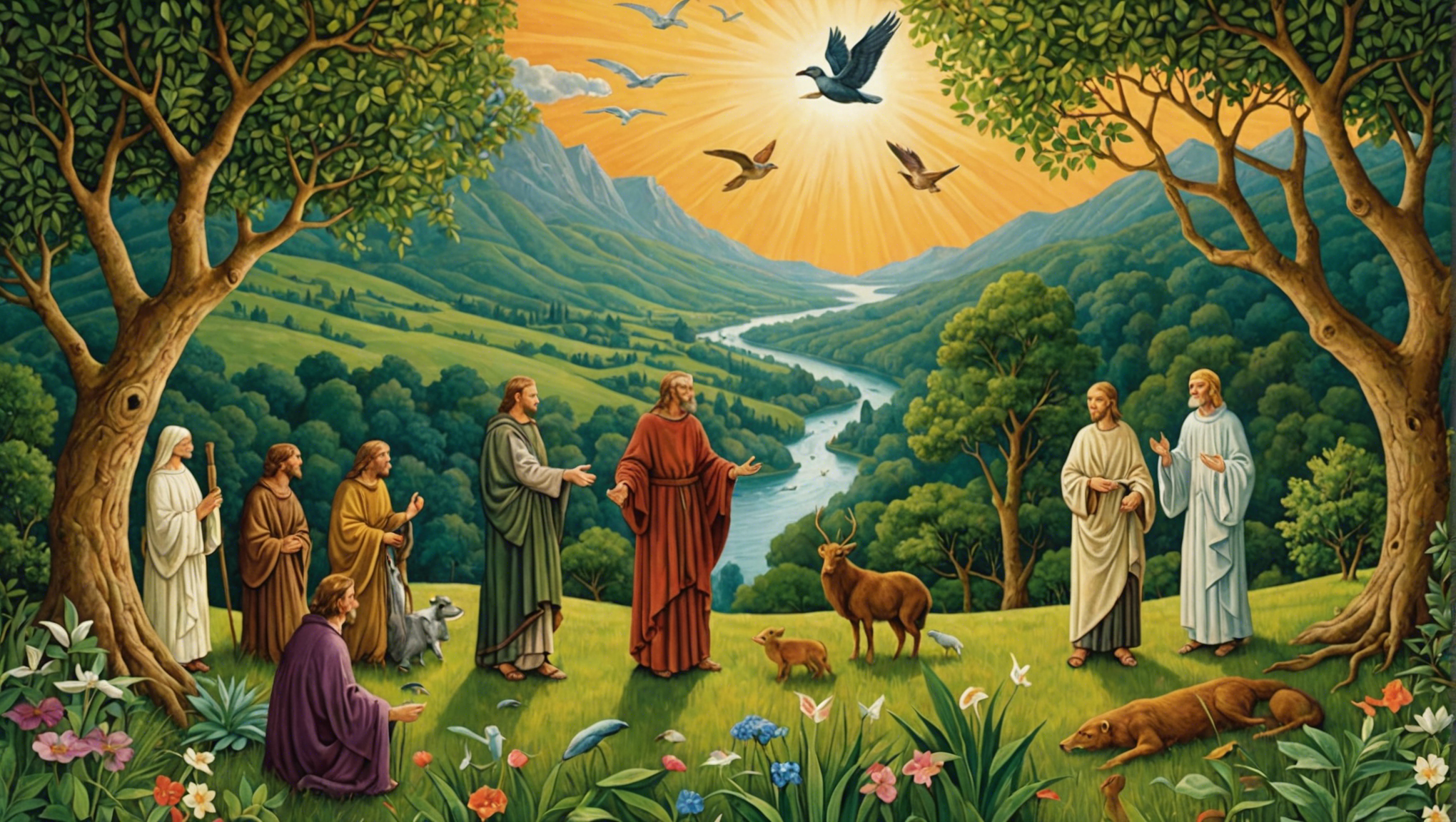In exploring the profound connection between theology and ecology, we delve into the creation story’s impact on our understanding of the natural world. Join me on a journey to unravel the intricate relationship between theology and ecology, and how ancient beliefs continue to shape our environmental consciousness today. Let’s uncover the timeless wisdom that guides our stewardship of the Earth.
Exploring the Origins of Creation Narratives

The Interplay of Theology and Ecology
The interconnectedness between theology and ecology has been a subject of profound importance in understanding humanity’s relationship with the natural world. The way we perceive the creation narratives in theological texts can significantly influence our attitudes and actions towards the environment.
Creation Narratives: A Theological Perspective
Throughout religious traditions, creation narratives offer insights into the origins of the universe, humanity’s place in it, and the responsibilities entrusted to human beings as stewards of the earth. These narratives often emphasize themes of stewardship, harmony, and interconnectedness between all living beings.
The Influence on Environmental Ethics
By delving into the theological roots of creation narratives, we can discern the ethical implications for our treatment of the environment. The belief that the earth is a sacred creation entrusted to humans by a divine being can inspire a sense of reverence and care towards nature.
Reimagining Human-Nature Relationships
Exploring the origins of creation narratives allows us to reconsider and reshape our relationships with the natural world. Viewing nature as a valuable and interconnected part of creation can lead to a shift in perspective that promotes sustainable and respectful interactions with the environment.
Examining the Interconnectedness of Theology and Ecology

The Sacred Bond Between Theology and Ecology
From time immemorial, theology and ecology have been intricately intertwined, forming a sacred bond that reflects the interconnectedness of all life on Earth.
Ecology in Theological Thought
Within theological discourse, the concept of ecology extends far beyond the mere study of ecosystems and the environment. It delves into the core of religious teachings, emphasizing the stewardship of creation and the interconnectedness of all living beings.
The Wisdom of Interconnectedness
Ecology teaches us that every action has a consequence, and every being is interdependent on the web of life. This wisdom resonates deeply with theological teachings that highlight our responsibility to care for the Earth and nurture a harmonious relationship with all of creation.
The Call to Environmental Stewardship
Embedded within theological traditions is a profound call to environmental stewardship. Recognizing the divine spark in every living entity, theologians emphasize the importance of protecting the environment, preserving biodiversity, and safeguarding the delicate balance of ecosystems.
Ecological Ethics and Theological Reflection
Ecological ethics challenge us to reconsider our relationship with the Earth and each other, prompting theological reflection on the moral imperative to act as responsible caretakers of our planet. This interconnected dialogue fosters a holistic understanding of our place within the intricate tapestry of life.
The Healing Power of Unity
By embracing the interconnectedness of theology and ecology, we open ourselves to a profound healing power that transcends boundaries and divisions. This unity invites us to revere the Earth as a sacred gift and honor our interconnected role in upholding the sanctity of all life forms.
Analyzing the Impact of Beliefs on Environmental Stewardship

The Role of Theological Perspectives in Shaping Environmental Stewardship
The relationship between theology and environmental stewardship is a crucial aspect that influences how individuals and communities perceive and engage with the natural world. The theological frameworks that people hold shape their understanding of humanity’s role in caring for the Earth.
Interpreting Sacred Texts for Environmental Ethics
Many religious traditions have sacred texts that offer insights into the relationship between humans and the environment. Interpreting these texts through an ecological lens can provide a foundation for environmental ethics and sustainable practices.
Cultivating a Sense of Environmental Responsibility Through Theology
Theological teachings often emphasize themes of stewardship, compassion, and interconnectedness. These values can inspire individuals to cultivate a sense of environmental responsibility and take action to protect the planet for future generations.
Challenges and Controversies in Applying Theology to Environmental Issues
While theology can be a powerful motivator for environmental stewardship, it can also present challenges and controversies. Interpretations of religious teachings may vary, leading to differing perspectives on how to address environmental issues.
Collaborative Approaches Between Theology and Ecology
To address pressing environmental challenges, there is a growing need for collaboration between theologians, scientists, and policymakers. By bridging the gap between theology and ecology, innovative solutions can be developed to promote sustainable practices and protect the planet.
Considering Indigenous Perspectives on Creation and Conservation
The Interconnection of Theology and Ecology
The relationship between theology and ecology is a complex and intricate one, often overlooked in contemporary discourse. The way we understand and interact with the natural world is deeply intertwined with our theological beliefs. Indigenous perspectives, in particular, offer a unique insight into this interconnectedness, emphasizing the sacredness and interconnectedness of all living beings.
Sacredness of Creation in Indigenous Worldviews
Indigenous communities around the world have long held a deep reverence for the natural world, seeing it as a sacred gift from the divine. Their spiritual traditions are deeply rooted in the belief that all living beings – humans, animals, plants, and even rocks and rivers – are interconnected and deserving of respect. This perspective challenges the dominant Western view of nature as a resource to be exploited for human benefit.
The Role of Conservation in Indigenous Traditions
Conservation practices within Indigenous communities are often based on principles of reciprocity and stewardship. Many Indigenous traditions include rituals and ceremonies that honor the land and its resources, emphasizing the need to give back in return for what is taken. This holistic approach to conservation stands in stark contrast to mainstream conservation efforts that prioritize human interests over the well-being of the entire ecosystem.
Bridging the Gap Between Theology and Ecology
By integrating Indigenous perspectives on creation and conservation into theological conversations, we can expand our understanding of the interconnectedness of all living beings and our responsibilities to the Earth. This holistic approach challenges us to reconsider our relationship with the natural world and move towards more sustainable and ethical ways of living.
Embracing Diversity in Environmental Theology
As we explore the influence of theology on ecology, it is essential to acknowledge and celebrate the diversity of perspectives and beliefs that exist around the world. By engaging with Indigenous wisdom and incorporating it into our theological frameworks, we can create a more inclusive and comprehensive understanding of the sacredness of creation and our role in its preservation.
Reflecting on the Role of Religion in Shaping Environmental Policies
The Role of Theology in Shaping Environmental Policies
Religion and theology have played a significant role in influencing environmental policies around the world. Many religious traditions and teachings emphasize the importance of stewardship of the Earth and living in harmony with nature. This theological perspective has had a profound impact on the development of environmental ethics and policies.
Interconnectedness Between Religion, Ethics, and Environmental Concerns
Religions often provide a moral framework that shapes individuals’ ethical beliefs and behaviors towards the environment. Concepts such as interconnectedness, compassion, and justice, commonly found in religious teachings, have been instrumental in shaping attitudes towards nature and sustainability. This ethical foundation is reflected in the environmental policies adopted by governments and organizations globally.
The Influence of Religious Institutions on Environmental Advocacy
Religious institutions and leaders have been actively involved in advocating for environmental protection and sustainability. Through social initiatives, outreach programs, and public statements, religious communities have raised awareness about environmental issues and mobilized support for policy changes. Their influence extends beyond spiritual guidance to practical actions that promote environmental stewardship.
Challenges and Controversies at the Intersection of Theology and Ecology
Despite the positive contributions of theology to environmental policies, there are challenges and controversies at this intersection. Differences in theological interpretations, debates over the use of natural resources, and conflicts between economic interests and environmental conservation often create tensions within religious communities and society at large. Navigating these complexities requires a nuanced understanding of both theological principles and environmental realities.
Building Bridges for a Sustainable Future
As we navigate the complex landscape of theology and ecology, it is essential to foster dialogue and collaboration between religious groups, policymakers, scientists, and environmental activists. By building bridges across different sectors, we can develop holistic solutions that address environmental challenges while respecting diverse theological perspectives. This interdisciplinary approach is crucial for creating a sustainable and harmonious future for all living beings on Earth.
Investing in Eco-Theology: Bridging the Gap between Faith and Sustainability
Understanding the Intersection of Faith and Sustainability
In today’s world, the pressing need for environmental conservation and sustainable living practices has become increasingly apparent. At the same time, faith communities around the globe have a rich history of advocating for social justice and stewardship of the Earth. By delving into the field of eco-theology, we can explore the profound connection between religious beliefs and environmental ethics.
Reimagining Spiritual Practices in a Sustainable Light
One of the key aspects of eco-theology is reimagining traditional spiritual practices in the context of sustainability. This involves fostering a deeper sense of reverence for creation, integrating eco-friendly rituals into religious ceremonies, and promoting responsible consumption habits among believers.
Embracing Theological Perspectives on Environmental Issues
Incorporating theological perspectives into discussions on environmental issues can lead to a more holistic approach to sustainability. By drawing on religious teachings that emphasize compassion, justice, and interconnectedness, we can develop a deeper understanding of our ethical responsibilities towards the planet.
Fostering Dialogue and Collaboration Across Faith Communities
One of the most significant advantages of investing in eco-theology is the potential for fostering dialogue and collaboration across diverse faith communities. By transcending religious divides and coming together in a shared commitment to environmental stewardship, believers can amplify their impact and work towards a more sustainable future.
Educating and Empowering Future Generations of Environmental Activists
Investing in eco-theology also involves educating and empowering future generations of environmental activists within faith communities. By integrating ecological themes into religious education curricula and providing resources for environmental advocacy, we can inspire a new wave of eco-conscious leaders committed to sustainability.
